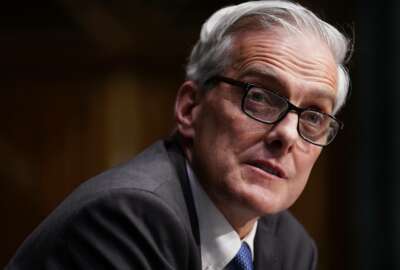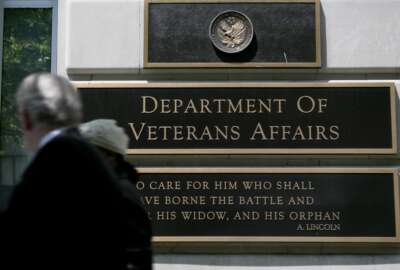VA makes the case for another record funding request in 2022
The Department of Veterans Affairs expects the pandemic-driven surge in demand for its services will continue well into 2022, putting pressure on its staff and ...
The Department of Veterans Affairs is entering uncharted territory as it recovers from a global pandemic and sees a growing number of veterans return to the agency for health care.
Senators are still trying to understand what the post-pandemic recovery means for VA’s budget, staffing and demand on the community care program — and how all the numbers fit together.
The Biden administration proposed $270 billion for the department in 2022, the largest funding request ever for VA. That’s on top of the $19.6 billion Congress gave VA last March through the Coronavirus Aid, Relief and Economic Security (CARES) Act, which the department hasn’t quite exhausted.
The department received another $17 billion through the American Rescue Plan earlier this year, which is funding supply chain improvements, employee overtime and digital scanning efforts designed to address a backlog of disability claims.
“There’s been so many things related to COVID-19 and the infrastructure plan; there’s just a lot of things now that are out there for us to figure out, in my view, how it all fits together,” Jerry Moran (R-Kan.), ranking member of the Senate Veterans Affairs Committee, said Wednesday at a hearing on VA’s 2022 budget request.
The department is asking for a 15% increase in medical care funding, a 63% boost since 2018, Moran said.
For Moran, the numbers don’t add up, as VA is seeing a 5% increase in the number of outpatient visits and a 2.4% increase in the number of unique patients coming to the department for health care.
VA is experiencing a surge in demand for health care, Secretary Denis McDonough said Wednesday, reiterating a point he made last week before the House Veterans Affairs Committee. Veterans who put off medical treatment during the pandemic are returning to VA in droves, he said.
Between March and May of this year, VA facilitated 16.5 million appointments within its own system and sent veterans out to the community for an additional 1.25 million appointments, McDonough told the committee.
VA facilitated 9 million appointments and fewer than 700,000 community care visits during that same period last year.
The impact of COVID-19 and the demand for VA care is responsible for nearly 8% of the proposed health services funding increase, said Jon Rychalski, the department’s chief financial officer.
As more veterans return to VA, the department is confronting a familiar challenge — how to balance in-house health care with services from the private sector.
“The cost implications are significant,” McDonough said. “We’ve been talking to your teams and the appropriators, just in full candor, about whether we have the money to make it through this year. We’ll be continuing to talk to you about that in terms of community care funding.”
VA anticipates the surge for health care services will continue into 2022, and it’s why the department projects an increase in employee staffing next year as well.
Moran said the Veterans Health Administration alone envisions a workforce of nearly 370,000 in 2022, a 17% increase over 2018.
According to the latest data from the department, VA had 32,648 vacancies as of the end of March, with 29,787 of them inside VHA alone.
The department has been engaged in a concerted hiring campaign since the start of the pandemic. McDonough told reporters Tuesday that VA’s pandemic hiring campaign had reduced the number of overall workforce vacancies, and the department’s 2022 budget request included funds to retain those new hires.
According to VA data, the department had 3,309 net hires in the second quarter of the year.
“We can’t deliver on our promises to veterans if we don’t have the workforce to do so,” committee Chairman Jon Tester (D-Mont.) said. “This is particularly concerning given the rate at which the department is sending veterans into the community for care. We need to talk about the balance between in-house and community care, and VA staffing is critical in that conversation.”
Meanwhile, Tester urged the Senate to quickly confirm the four pending VA nominees to their positions, including Donald Remy, the president’s pick to be deputy secretary at the department, and Maryanne Donaghy, the nominee to lead the beleaguered Office of Accountability and Whistleblower Protection.
The Senate committee unanimously advanced all four nominees, but Marsha Blackburn (R-Tenn.) has a hold on them.
“Hopefully folks up here will stop playing games so we can get the four pending VA nominees confirmed and on the job working for veterans,” said Tester, who delivered an impassioned speech from the Senate floor on Wednesday urging his colleagues to confirm them.
McDonough said he needs the pending VA nominees in place — especially his deputy secretary — to help him staff a commission to find a new undersecretary for benefits.
Copyright © 2024 Federal News Network. All rights reserved. This website is not intended for users located within the European Economic Area.
Nicole Ogrysko is a reporter for Federal News Network focusing on the federal workforce and federal pay and benefits.
Follow @nogryskoWFED






